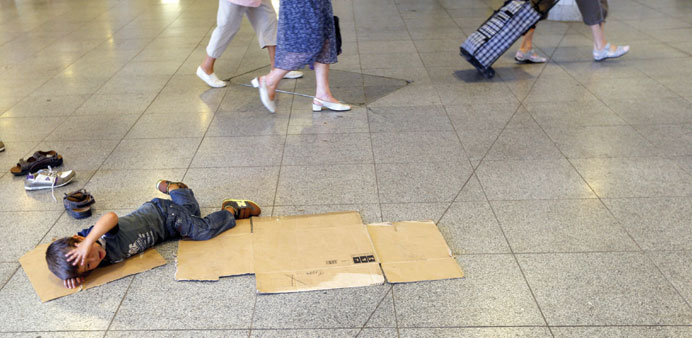A migrant boy lies on the floor while waiting to leave Hungary at a train station in Budapest. About 100,000 migrants, many of them from Syria and other conflict zones in the Middle East, have taken the Balkan route into Europe this year, heading via Serbia for Hungary and Europe’s Schengen zone of passport-free travel. Most of them move on to richer countries such as Austria and Germany.
AFP/Kecskemet, Hungary
Four suspects in Austria’s migrant truck tragedy were remanded in custody in Hungary yesterday as Austrian police rescued three “severely dehydrated” refugee children packed into another vehicle.
The young children were hospitalised after the truck containing 26 “illegal foreigners” from Syria, Bangladesh and Afghanistan was pulled over by police early on Friday after a chase close to the German border.
“If the journey had continued the situation could probably have become critical,” a spokesman for police in Upper Austria state told AFP.
The Romanian driver, who had refused to pull over for a routine check, was arrested.
The incident came a day after the decomposing bodies of 71 migrants including four children were found in an abandoned truck on a motorway in eastern Austria near the Hungarian border, provoking international revulsion.
Saying that he was “horrified and heartbroken” by the gruesome discovery and a new Mediterranean shipwreck claiming at least 111 lives, UN Secretary General Ban Ki-moon said it was high time for concerted action to tackle the crisis.
“I appeal to all governments involved to provide comprehensive responses, expand safe and legal channels of migration and act with humanity, compassion and in accordance with their international obligations,” Ban said (see also page 26).
The abandoned truck, found on Thursday on an Austrian motorway in the baking sun near the Hungarian border, contained the tightly packed bodies of 59 men, eight women and four children.
They were thought to be Syrians.
The tragic discovery highlighted the dangers faced by people fleeing conflict and hardship in the Middle East and Africa even once they reach Europe, with many putting their fate in the hands of profit-hungry people smugglers.
In the new Mediterranean disaster off Libya, rescue workers said yesterday that in addition to the 111 who were confirmed dead, “dozens” were still missing.
A total of 198 among the 400 on board have been rescued.
The United Nations estimates 300,000 people have fled conflict and hardship in the Middle East and Africa for a better life in Europe this year, and 2,500 more have died in the attempt, mostly in the Mediterranean.
“My little sister, someone climbed on her back and pushed her down. When I saw her for the last time, she was underwater with him on top of her,” Pakistani Shefaz Hamza, 17, a survivor who also lost his mother in the latest tragedy, told AFP in Libya.
In Hungary, three Bulgarians and one Afghan arrested over the Austrian case were remanded in custody yesterday until September 29 in Kecskemet, a town near the Serbian border where more than 140,000 have crossed this year.
Police believe them to be low-ranking members of one of the numerous, often unscrupulous human trafficking gangs that transport thousands of migrants coming to Europe – in return for sometimes exorbitant amounts of money.
The four suspects – the Bulgarians are aged 29, 30, and 50, and the Afghan aged 28 – declared their innocence yesterday and said they would appeal the court decision.
Only one had legal residence in Hungary.
The discovery in Austria was a rare occurrence on land in a prosperous country when so many migrants have died at sea.
Police said the people may have been dead for up to two days.
But as illustrated by the latest case with the three children, such a tragedy was only a matter of time as tens of thousands of people seek to make it north from Greece, Italy and Hungary to places like Germany and Sweden.
Hungary for one is having difficulty coping with the crisis.
Yesterday around 150 Syrian migrants unhappy about not being able to leave the country, and held in a packed “transit zone” at one of Budapest’s main train stations, staged a demonstration shouting “Let us go!”
An AFP reporter on the Greece-Macedonia border said yesterday that migrants were continuing to cross in groups of 50, following the more than 100,000 to have trekked through the western Balkans this year bound for the EU.
“We estimate that some 1,500 people are able to cross the Greek border into Macedonia each day, though of course the situation changes every day,” said UN refugee agency spokeswoman Stella Nanou.
One of them, Ali Younes, a 65-year-old Iraqi, sold his home in Baghdad to pay a smuggler to reach Turkey through Syria.
He risked his life in an inflatable boat to get to the Greek island of Samos from Turkey.
“I lived through everything: the Iran-Iraq war, the invasion of Kuwait, the sanctions period, the US occupation, the sectarian war, and now Daesh,” Younes told AFP, referring to the Islamic State (IS) extremist group controlling large swathes of Iraq and Syria.
In Germany, meanwhile, which expects to absorb 800,000 asylum seekers this year, between 2,000 and 4,000 people demonstrated in the eastern city of Dresden yesterday in solidarity with refugees, an AFP reporter said.
The nearby town of Heidenau, which has become a flashpoint for anti-migrant protests and where Chancellor Angela Merkel was booed last week, was calm overnight, although Germany’s top court overturned a ban on demonstrations there.

